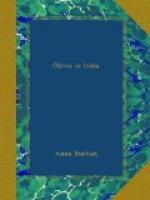To-day I am going to devote entirely to writing. Surely my book will make some progress now. How many words should there be in a book? I’ve got 18,000 now; “ragged incompetent words” they are, too. I wonder what makes a writer of books! Would knowing all the words in the dictionary help me? My statements are so bald, somehow. It doesn’t seem an interesting tale to me, so I’m afraid I can’t expect an unprejudiced reader to find it thrilling. The Mutiny is perhaps too large a subject for me—though, mind you, there is one bit that sounds rather well. I have taken great pains with it, and, as Viola said of her declaration, “’tis poetical!” The worst of it is, when I write poetically I am never quite sure that I am writing sense. I dare say I would be wise to take the Moorwife’s advice. You remember in The Will-o’-the Wisps are in Town, when the man had listened to the Moorwife’s tale he said, “I might write a book about that, a novel in twelve volumes, or better, a popular play.”
“Or better still,” said the Moorwife, “you might let it alone,”
“Ah,” said the man, “that would be pleasanter and easier.”
How true!
Baratah, Thursday, Feb. 28.
We are still in Baratah, as you see, and shall be till Tuesday. It is a very nice life this nomadic existence, and one gets nearer the people. They come in little groups and talk to Boggley outside his tent, and I must say he is most patient with them and tries to do his very best for each one of them. They make my heart ache, these natives, they are so gentle and so desperately poor. Isn’t it Steevens who says the Indian ryot has been starving for thirty centuries and sees no reason why he should be filled?
The Listers are home now and we have been seeing a lot of them. They are delightful people. Mrs. Lister is quite a girl, and so good-looking and cheery. She has the prettiest house I think I ever saw. When we went to call the first time and were shown into the white-panelled drawing-room with its great open blue-tiled fireplace and cupboards of blue china, I suppose it was the contrast with our own rather sordid surroundings, but it seemed to me like fairyland. The hall is lovely, with a gallery all round and most exquisite carving; rose-red velvet curtains, Persian rugs glowing with rich, soft colours, and everywhere great silver bowls of flowers. They are the most hospitable people, and ask us to dinner every night, and to every other meal as well. Mr. Lister told me babu stories last night. Here is one. The Government sent round making inquiries about some Scandinavians. (Please don’t ask why Scandinavians, because I can’t answer.) The Sub-Divisional Officer forwarded the reference to the different police-stations for report. The babus in charge of these stations hadn’t an idea what Scandinavians were, but would have scorned to ask. Three of the reports ran thus:
1. “Honoured Sir, I have the honour to report that the Scandinavian has been concluded in this district and has been removed to Lahserai.” (Survey and Settlement operations.)




